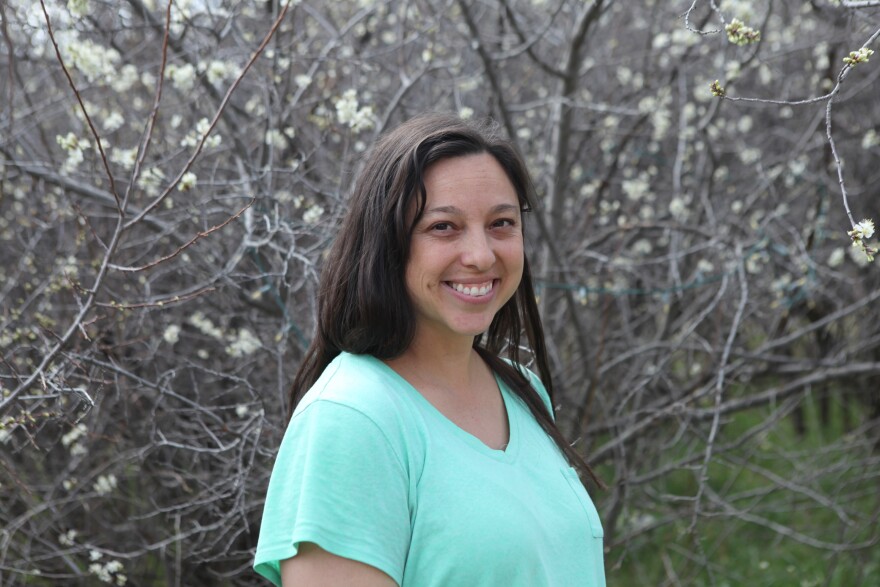On a beautiful spring day at his family farmhouse in Pilar, Tómas Vigil walks round the field where he will plant this year's green chile, and shows me the apple orchard. After a snowy winter, the acequia is running with water melting off the mountains and the growing season looks promising.
But all the properties along this dirt road by the Rio Grande used to be farms, and he says this is the only one left.
"I'm one of the youngest farmers, if not the youngest that I know," he says. He is 35. And the farm is not profitable. Some years he will sell at a farmer's market, but others he will just feed his friends and family, or swap his tomatoes for a friend's greens.
"I've even traded him rattlesnakes for vegetables," says Vigil. "He eats them! Nothing goes to waste out here."
Like many in this region, Vigil traces his family back many generations and says his father and grandfather farmed this land. When his father was dying, he promised he would keep the farm going.
"I'm the last of those people, descendants of 400 years ago, that's still keeping the tradition alive," he says.
But the market price of fruit and vegetables is not high enough to pay overheads on a small farm. If he had a greenhouse or new machinery, he might be able to make a living, but his applications for grants and loans have been unsuccessful.
So, his main work is as a mechanic in Albuquerque.
Vigil's situation is far from unique. The last few years may have looked like bumper times for farmers, with nationwide net farm income of nearly $170 billion last year. But the U.S. Agriculture Secretary Tom Vilsack told the Senate Agriculture Committee in March nearly all that profit goes to a few, large scale producers.
"Nearly 50% of our farmers did not make any money at all, in those record years," Vilsack said. "In fact, they lost money. Another almost 40% of our farmers made money, but the majority of money they made came from off-farm income."
For decades, the government has offered incentives like grants and subsidies for farms to get bigger, mechanize and to grow commodity crops like corn and soybeans
"The problem," Vilsack continued in his speech, "is that farms continue to get larger and larger and larger, okay, which squeezes out the small- and mid-sized farming operation, which is what populates the rural communities, which supports the school, the hospital, the main street businesses."
The 2020 census recorded the first-ever decade-long fall in rural population. The Bureau of Labor Statistics predicts a three percent drop in employment of farmers, ranchers, and other agricultural managers between 2021 and 2031. And the average farmer is 57 and a half years old
But at least in New Mexico, some young people do want to farm.

Angeles Ribero works on a farm project in the town of Taos with the Youth Conservation Corps. She says she feels connected with the region's agricultural heritage when she grows food.
"It's so amazing, honestly, you don't see many things in the real world where you just plant something, and then – three days later, you see something come up," she said.
But she does not think she could make a career out of farming.
"It sounds like there's a lot of barriers to people that are not born farmers, getting land, getting the money, to do with loans," she said.
Some politicians and activists are trying to keep small farms and rural communities going. This year, they're focused on the Farm Bill, which gets thrashed out in Washington every five years.
New Mexico Senator Ben Ray Luján, who grew up on a small farm, sits on the Senate Agriculture Committee and wants to help.
"A lot of programs within the USDA don't work for the small producers," he told KUNM. "And I want to ensure that they do: whether it's insurance or access to programs to improve water systems or irrigation systems, even a hoop house."
Meanwhile the National Young Farmers Coalition is calling for the Farm Bill to create a million acres of new farmland by, for instance, making credit easier and expanding federal land access. Corilia Ortega, a small-scale grower and member of the Taos City Council, is a passionate member of the coalition.

"All humans should feel comfortable and competent to grow any type of food, because we are," she said.
She thinks about the need for land when she saves seeds every year.
"Where do the seeds go if we haven't systematically, conscientiously thought of the lands that we need to preserve and protect for the future?"
Policy expert Anne Schechinger of the nonprofit The Environmental Working Group says paying for these new policies would be possible if subsidies to large farms were reduced.
"Right now farmers qualify for farm subsidies, as long as their annual income is below $900,000 per person, so that's a really large amount of money to still qualify for payments," she said. "So if you lower this income limit, it can stop millionaire farmers from receiving payments, and it would provide a larger pool of money for these smaller farmers."
Farm subsidies have long been politically hard to take on. In the March meeting of the Senate Agriculture Committee, some senators argued food security and prosperity depend on continuing support to large farms, which produce much more food than small ones.
Vilsack countered that the choice was not either/or, but added, "our goal, simply stated, is to keep people on the farm."
Out by the Rio Grande on Vigil's farm he points out we stand in a conservation area for the river and wildlife. But what about the people?
"Why not preserve the farm that's in the heart of it," he asks.
He worries his family will one day sell the land, developers will come and an old way of life, a historic community will be gone.




